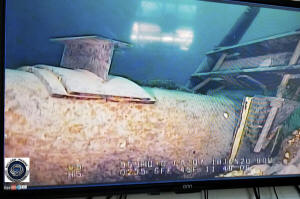Trump DOJ argues Michigan effort to shut down underwater pipeline
interferes with US foreign policy
[September 20, 2025] By
TODD RICHMOND
The Trump administration is stepping into the legal fight over whether
Enbridge can continue to operate an aging pipeline beneath a Great Lakes
channel, arguing that Michigan Gov. Gretchen Whitmer interfered with
U.S. foreign policy when she revoked the line's easement almost five
years ago.
The pipeline, known as Line 5, has moved crude oil between Superior,
Wisconsin, and Sarnia, Ontario, since 1953. A 4.5-mile (6.4-kilometer)
segment of the line runs under the Straits of Mackinac, a channel that
links Lake Michigan and Lake Huron.
Concerns about the line rupturing and causing a catastrophic spill in
the environmentally sensitive area have been growing since 2017, when
Enbridge revealed its engineers had known about gaps in its protective
coating since 2014. A boat anchor damaged the segment a year later,
further stoking fears of a spill.
Whitmer, a Democrat and possible 2028 presidential contender, ordered
her regulators in November 2020 to revoke the easement allowing the
segment to operate beneath the straits. Enbridge filed a federal lawsuit
that same year seeking to invalidate the order. The pipeline has
continued to operate as the litigation drags on.
Trump attorneys say Michigan interfering with foreign policy, 1977
treaty
The Trump administration isn't a party in the case. But U.S. Justice
Department attorneys filed a brief on Sept. 12 arguing that Whitmer's
order amounted to an attempt to “globalize” Michigan's regulatory
authority and clash with the federal government's goal of maintaining
the flow of energy between the U.S. and Canada.

They also contend that the revocation clashes with executive orders
President Donald Trump issued this year declaring that an abundant,
reliable energy supply is key to protecting national security.
“Shutting down Line 5 could disrupt the energy supply chain, increase
domestic prices, and enhance the economic and political power and
leverage of malign foreign actors worldwide,” the attorneys wrote. “Such
outcomes conflict with our nation's foreign policy goals.”
They argue, too, that only the federal government can regulate pipeline
safety and allowing states to enter that arena would lead to a untenable
patchwork of regulations. A 1977 treaty between the U.S. and Canada
prohibits authorities from impeding the flow of energy through pipelines
running between the two counties, they add.

Whitmer's attorneys say the state has authority to revoke the easement
under the public trust doctrine, the legal principle that natural
resources belong to the public and the state therefore has a duty to
protect them.
Danny Wimmer, a spokesperson for Michigan Attorney General Dana Nessel,
who is defending the revocation, said in an email Friday that Nessel
plans to file a response in October. He pointed to earlier filings in
which she argues that revoking the easement doesn't impose or continue
any safety regulations and is actually a pipeline routing decision
within the state's authority. The filings also contend that private
parties such as Enbridge can't bring a federal lawsuit to enforce the
treaty with Canada.
[to top of second column] |

This photo provided by the Michigan Department of Environment, Great
Lakes, and Energy in June 2020 shows damage to anchor support
EP-17-1 on the east leg of the Enbridge Line 5 pipeline in the
Straits of Mackinac in Michigan, displayed on a television screen.
(Michigan Department of Environment, Great Lakes, and Energy via AP,
File)
 The Trump administration's arguments
largely mirror those of Enbridge. Asked for comment on the
administration's filing, company spokesperson Michael Barnes in an
email Friday pointed again to treaty provisions that he said prevent
states and judges from unilaterally shutting down the pipeline.
U.S. District Judge Robert Jonker has scheduled a hearing on a
Enbridge motion for summary judgment on Nov. 12.
Trump's decision to take a stance in the case is a setback for
Whitmer as she tries to protect her state's interests without
incurring the president's wrath. She has stepped lightly around
Trump, convincing him to meet with her three times since January. In
April, Trump called her a “very good person."
Enbridge says tunnel would protect Line 5
Enbridge has proposed encasing the straits segment in a protective
concrete tunnel, at an estimated cost of at least $500 million.
Construction would destroy wetlands and bat habitat but the tunnel
would eliminate the chance of another anchor rupturing the line,
according to the U.S. Army Corps of Engineers.
Michigan regulators approved permits for the tunnel in December
2023. Enbridge needs only Army Corps' approval before construction
can begin. The Corps fast-tracked the permit in April after the
Trump administration identified the tunnel for expedited emergency
permitting.
Environmental groups and Native American tribes have sued the
Michigan Public Service Commission, arguing the panel didn't
consider the overall need for the pipeline when weighing whether to
grant the tunnel permits. The Michigan Supreme Court announced
Friday that it would hear the case.
More legal sparring
Nessel filed her own lawsuit seeking to void the straits easement in
2019. The U.S. Supreme Court is weighing whether the case belongs in
federal or state court.
The pipeline is at the center of a yet another legal dispute, this
time in Wisconsin. A federal judge in Madison last summer gave
Enbridge three years to shut down part of Line 5 that runs across
the Bad River Band of Lake Superior’s reservation. The company has
proposed rerouting the pipeline around the reservation and has
appealed the shutdown order to the 7th U.S. Circuit Court of
Appeals.
On a separate legal track, environmental groups and the Bad River
Band have asked a judge to void state permits for the reroute.
Hearings in that matter are scheduled to stretch into October.
All contents © copyright 2025 Associated Press. All rights reserved
 |